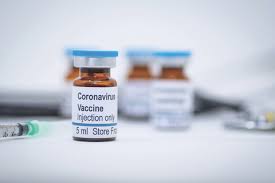
The link between Covid-19 infections and deaths has been significantly weakened by the mass vaccination drive conducted in the United Kingdom but the link is yet to be broken completely. This comment was made by the head of a scientific advisory body to the government on Sunday.
The UK Prime Minister Boris Johnson is anticipating a complete lifting of most of the remaining coronavirus restrictions on July 19. The government was forced to delay further lifting of pandemic restrictions this month due to an increase in the number of fresh cases of the disease primarily caused by the more infectious Delta variant of the coronavirus.
Britain was seeing a "much lower level of hospitalisation", commented Peter Horby, chair of the government's New and Emerging Respiratory Virus Threats Advisory Group (NERVTAG), dur4ing an interview to the BBC.
He was asked whether was e3nough data currently available to conclude that the Covid-19 vaccinations had been able to break the link between the virus and serious illness and death.
"They've certainly weakened the link," Horby said answering the vaccination programme. More than 80 per cent of the total adult population of the country have been administered the fr4ist dose of a vaccine while more than 60 per cent of the adult population have been administered both the doses, showed official data.
"We're definitely seeing increasing infection rates, but what we're seeing is a much lower level of hospitalisation, so that link is really, really much weaker which is really fantastic but it's not completely broken," Horby said.
On Saturday, 18,270 new coronavirus infections were recorded in the United Kingdom which was the highest daily rise in infections since February 5. There were also 23 deaths form the disease on Saturday, showed official data. With more than 128,000 deaths, Britain has had one of the highest coronavirus death tolls in the world on the overall.
If the government had put in place stronger border measures, the arrival and spread of the Delta variant – which was first identified in India and is very infectious and the driver of the current wave of infections in the country, could have been delayed or even prevented, Horby also said as an argument.
"But there is an obvious trade-off that policy makers and politicians have to make between absolute complete restrictions and stopping various viruses coming in," he added.
(Source:www.thestraitstimes.com)
The UK Prime Minister Boris Johnson is anticipating a complete lifting of most of the remaining coronavirus restrictions on July 19. The government was forced to delay further lifting of pandemic restrictions this month due to an increase in the number of fresh cases of the disease primarily caused by the more infectious Delta variant of the coronavirus.
Britain was seeing a "much lower level of hospitalisation", commented Peter Horby, chair of the government's New and Emerging Respiratory Virus Threats Advisory Group (NERVTAG), dur4ing an interview to the BBC.
He was asked whether was e3nough data currently available to conclude that the Covid-19 vaccinations had been able to break the link between the virus and serious illness and death.
"They've certainly weakened the link," Horby said answering the vaccination programme. More than 80 per cent of the total adult population of the country have been administered the fr4ist dose of a vaccine while more than 60 per cent of the adult population have been administered both the doses, showed official data.
"We're definitely seeing increasing infection rates, but what we're seeing is a much lower level of hospitalisation, so that link is really, really much weaker which is really fantastic but it's not completely broken," Horby said.
On Saturday, 18,270 new coronavirus infections were recorded in the United Kingdom which was the highest daily rise in infections since February 5. There were also 23 deaths form the disease on Saturday, showed official data. With more than 128,000 deaths, Britain has had one of the highest coronavirus death tolls in the world on the overall.
If the government had put in place stronger border measures, the arrival and spread of the Delta variant – which was first identified in India and is very infectious and the driver of the current wave of infections in the country, could have been delayed or even prevented, Horby also said as an argument.
"But there is an obvious trade-off that policy makers and politicians have to make between absolute complete restrictions and stopping various viruses coming in," he added.
(Source:www.thestraitstimes.com)














